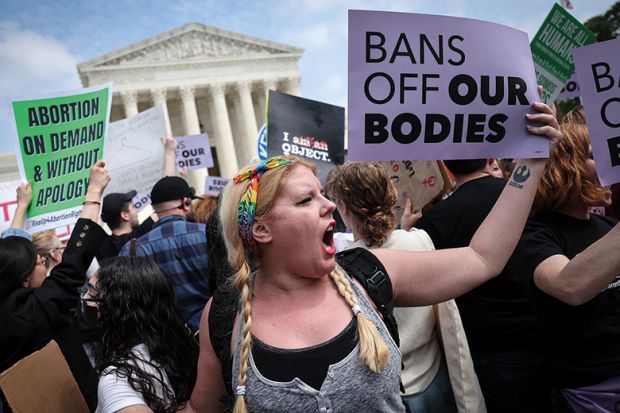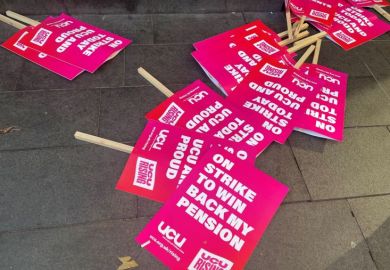The now-anticipated US Supreme Court ruling overturning abortion rights and the accompanying political shifts are raising expectations of universities in conservative states growing competitively weaker.
The nation’s top court, with its 6-3 majority of conservative-leaning justices, was shown in a leaked memo to be planning during the coming autumn session to end its 1973 ruling that protects the right of women to end a pregnancy.
Such a decision would hand states the ability to decide the legality of abortion, significantly expanding for many students and staff the incentives they already feel to avoid – if possible – those states they see as failing to respect individual and academic freedoms.
THE Campus resource: Engaging public health faculty to make healthier campus decisions
The imminent ruling was concerning to most Americans both for the abortion restrictions and for the threat the Supreme Court is posing to other rights involving gender and beyond, said Jeffrey Isaac, a professor of political science at Indiana University Bloomington.
“I definitely think such measures will make many academics think twice about moving to such states,” he said.
“Simply put,” said Cecilia Orphan, an associate professor of higher education at the University of Denver, “threats to academic freedom, shared governance and tenure have come hand in hand with threats to personal liberties related to abortion, relaxed gun control policies and attacks on critical race theory.”
States that restrict abortion should expect an especially negative effect on their medical schools, countering the extensive efforts that many of those states have been making to lure top research talent, said Edward Halperin, chancellor of New York Medical College.
The Roe v Wade ruling was so long ago that it is difficult to predict the results with precision, Dr Halperin said. “But I don’t think it would be extraordinary to think that the workforce will move to places where they feel like they can practise their medical specialty, and they are comfortable doing so, and they’re not going to be prosecuted for doing what they were trained to do and they think is appropriate,” he said.
If allowed by the Supreme Court, abortion bans are expected to appear rapidly in about half of all US states. Those states are generally not home to the nation’s better-ranked universities – with California, Massachusetts, New York, New Jersey, Connecticut and Illinois among the states committed to preserving reproductive rights.
But the states likely to take the opportunity to restrict abortion include several – such as Texas, North Carolina, Michigan, Pennsylvania and Georgia – that contain some leading institutions.
And while staff and students might want to leave or avoid institutions in such states, doing so will not necessarily be easy, said John Douglass, a research professor in public policy and higher education at the University of California, Berkeley. That is because students often attend a university in their home state, where costs are usually lower, and because academics are finding the job market too tight to allow for quick switches to new locations.
More immediate exceptions, Professor Douglass said, could include “some high-profile examples of eminent scholars announcing their departure”.
And universities could feel a relatively quick and large effect at the postgraduate student level, he said, “as there we find a national and global market for talent and mobility”.
Register to continue
Why register?
- Registration is free and only takes a moment
- Once registered, you can read 3 articles a month
- Sign up for our newsletter
Subscribe
Or subscribe for unlimited access to:
- Unlimited access to news, views, insights & reviews
- Digital editions
- Digital access to THE’s university and college rankings analysis
Already registered or a current subscriber? Login








